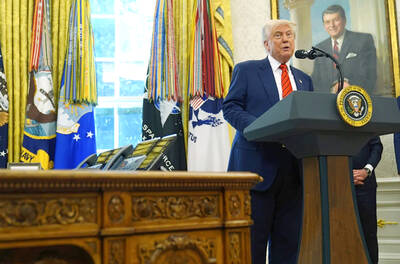Brutally hot weather is expected to hit China this summer, threatening a new round of power shortages that last year disrupted global supply chains of everything from vehicles to solar panels.
The electricity supply situation would be tight across the entire nation this summer, state-run China Energy News reported, citing the Chinese State Grid Energy Research Institute.
Central, eastern and southwestern provinces are likely to experience shortages during periods of peak demand, the institute said.

Photo: AP
A heat wave is already scorching parts of Asia even before the official start of the northern hemisphere summer, sending temperatures to a record 44.2°C in Vietnam, shutting schools early in the Philippines and putting India on alert for blackouts.
Climate change is exacerbating the frequency of extreme weather incidents, scientists at research groups such as World Weather Attribution say.
In China, temperatures in most parts of the nation would be relatively high this summer, with several regions forecast to experience periodic heat waves, the Chinese Meteorological Administration said.
More frequent droughts and flood-inducing rainstorms are also expected.
Last year, extreme heat and a lack of rain dried up the Yangtze River, with water reaching the lowest level on record in some stretches. That caused severe power shortages in areas dependent on hydroelectricity, such as Sichuan and Yunnan provinces, with officials curtailing supply to factories to ensure people could run air-conditioners at home.
Toyota Motor Corp and Honda Motor Co were among the companies affected.
In Yunnan, a key aluminum hub, power rationing began anew last month after another severe drought.
Despite that, the Shanghai Metals Market said output of the metal from southern China last month increased from March, as smelters restarted after upgrades, and should rise further this month.
Extreme weather is also affecting crops from rubber to peanuts, potentially requiring more imports to fill the gap and roiling global trade flows.
Beijing has prepared by ramping up production of coal, still its most important source of electricity even as utilities add record amounts of new wind and solar. Approvals have also been granted for a massive expansion of power plants using the fuel, many of which are intended to only be fully utilized at times of stress on power supply.
Current high coal inventories mean a nationwide power crisis is unlikely, Bloomberg NEF China Research head Nannan Kou said.

A new online voting system aimed at boosting turnout among the Philippines’ millions of overseas workers ahead of Monday’s mid-term elections has been marked by confusion and fears of disenfranchisement. Thousands of overseas Filipino workers have already cast their ballots in the race dominated by a bitter feud between President Ferdinand Marcos Jr and his impeached vice president, Sara Duterte. While official turnout figures are not yet publicly available, data from the Philippine Commission on Elections (COMELEC) showed that at least 134,000 of the 1.22 million registered overseas voters have signed up for the new online system, which opened on April 13. However,

ALLIES: Calling Putin his ‘old friend,’ Xi said Beijing stood alongside Russia ‘in the face of the international counter-current of unilateralism and hegemonic bullying’ Chinese President Xi Jinping (習近平) yesterday was in Moscow for a state visit ahead of the Kremlin’s grand Victory Day celebrations, as Ukraine accused Russia’s army of launching air strikes just hours into a supposed truce. More than 20 foreign leaders were in Russia to attend a vast military parade today marking 80 years since the defeat of Nazi Germany in World War II, taking place three years into Russia’s offensive in Ukraine. Putin ordered troops into Ukraine in February 2022 and has marshaled the memory of Soviet victory against Nazi Germany to justify his campaign and rally society behind the offensive,

CONFLICTING REPORTS: Beijing said it was ‘not familiar with the matter’ when asked if Chinese jets were used in the conflict, after Pakistan’s foreign minister said they were The Pakistan Army yesterday said it shot down 25 Indian drones, a day after the worst violence between the nuclear-armed rivals in two decades. Pakistani Prime Minister Shehbaz Sharif vowed to retaliate after India launched deadly missile strikes on Wednesday morning, escalating days of gunfire along their border. At least 45 deaths were reported from both sides following Wednesday’s violence, including children. Pakistan’s military said in a statement yesterday that it had “so far shot down 25 Israeli-made Harop drones” at multiple location across the country. “Last night, India showed another act of aggression by sending drones to multiple locations,” Pakistan military spokesman Ahmed

US President Donald Trump on Wednesday said that he would make a decision about how the US government would refer to the body of water commonly known as the Persian Gulf when he visits Arab states next week. Trump told reporters at the White House that he expects his hosts in Saudi Arabia, Qatar and the United Arab Emirates will ask him about the US officially calling the waterway the Arabian Gulf or Gulf of Arabia. “They’re going to ask me about that when I get there, and I’ll have to make a decision,” Trump said. “I don’t want to hurt anybody’s